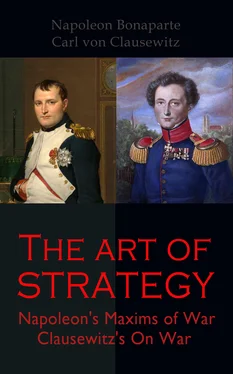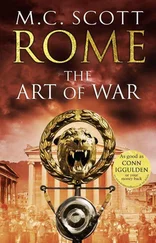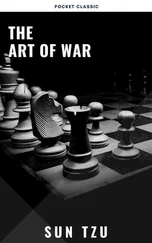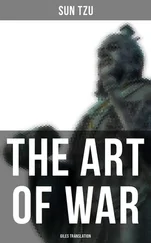Table of Contents
A good general, a well-organized system, good instructions, and severe discipline, aided by effective establishments, will always make good troops, independently of the cause for which they fight.
At the same time, a love of country, a spirit of enthusiasm, a sense of national honor, and fanaticism, will operate upon young soldiers with advantage.
This remark appears to me less applicable to officers than to soldiers, for as war is not a state of things natural to man, it follows that those who maintain its cause must be governed by some strong excitement. Much enthusiasm and devotedness are required on the part of the troops for the general who commands, to induce an army to perform great actions in a war in which it takes no interest. This is sufficiently proved by the apathy of auxiliaries, unless when inspired by the conduct of their chief.
Table of Contents
When a nation is without establishments and a military system, it is very difficult to organize an army.
This is an unanswerable truth, more particularly with reference to an army intended to act upon the system of modern war, and in which order, precision, and rapidity of movement, are the principal essentials to success.
Table of Contents
The first qualification of a soldier is fortitude under fatigue and privation. Courage is only the second; hardship, poverty and want, are the best school for a soldier.
Valor belongs to the young soldier as well as to the veteran; but in the former it is more evanescent. It is only by habits of service, and after several campaigns, that the soldier acquires that moral courage which makes him support the fatigues and privations of war without a murmur. Experience by this time has instructed him to supply his own wants. He is satisfied with what he can procure, because he knows that success is only to be obtained by fortitude and perseverance. Well might Napoleon say that misery and want were the best school for a soldier; for as nothing could be compared with the total destitution of the army of the Alps, when he assumed the command, so nothing could equal the brilliant success which he obtained with this army in the first campaign in Italy. The conquerors of Montenotte, Lodi, Castiglione, Bassano, Arcole and Rivoli had beheld, only a few months before, whole battalions covered with rags, and deserting for the want of subsistence.
Table of Contents
There are five things the soldier should never be without—his musket, his ammunition, his knapsack, his provisions (for at least four days), and his entrenching-tool. The knapsack may be reduced to the smallest size possible, if it be thought proper, but the soldier should always have it with him.
It is fortunate that Napoleon has recognized the advantage of giving to every soldier an entrenching-tool. His authority is the best answer to the ridicule which has been thrown upon those who proposed it. An axe will be found to inconvenience the foot-soldier as little as the sword he wears at his side, and it will be infinitely more useful. When axes are given out to companies, or are carried by fatigue-men during a campaign, they are soon lost; and it often happens, when a camp is to be formed, that a difficulty arises in cutting wood and building huts for the soldier; whereas, by making the axe a part of every man’s appointments, he is obliged to have it always with him; and whether the object be to entrench himself in a village, or to erect huts in a camp, the commander of a corps will speedily see the advantage of this innovation.
When once the axe has been generally adopted, we shall, perhaps, see the desirability of issuing pickaxes and shovels to particular companies, and also the benefit of more frequent entrenchments. It is more particularly during retreats that it is important to entrench when the army has reached a good position; for an entrenched camp not only furnishes the means of rallying troops which are pursued, but if it be fortified in such a manner as to render the issue of an attack doubtful to the enemy, it will not only sustain the morale of the soldier in the retreat, but afford the general-in-chief opportunities for resuming the offensive, and profiting by the first false movement on the part of his adversary. It will be recollected how Frederick, in the campaign of 1761, when surrounded by two Russian and Austrian armies, whose united force was quadruple his own, saved his army by entrenching himself in the camp of Buntzalvitz.
Table of Contents
Every means should be taken to attach the soldier to his colors. This is best accomplished by showing consideration and respect to the old soldier. His pay likewise should increase with his length of service. It is the height of injustice not to pay a veteran more than a recruit.
Some modern writers have recommended, on the other hand, to limit the period of service, in order to bring the whole youth of a country successively under arms. By this means they purpose to have the levies, en masse , all ready trained and capable of resisting successfully a war of invasion. But however advantageous at first sight such a military system may appear, I believe it will be found to have many objections.
In the first place, the soldier fatigued with the minutiæ of discipline in a garrison, will not feel much inclined to re-enlist after he has received his discharge, more especially since, having served the prescribed time, he will consider himself to have fulfilled all the duties of a citizen to his country. Returning to his friends, he will probably marry, or establish himself in a trade. From that moment his military spirit declines, and he soon becomes ill adapted to the business of war. On the contrary, the soldier who serves long, becomes attached to his regiment as to a new family. He submits to the yoke of discipline, accustoms himself to the privations his situation imposes, and ends by finding his condition agreeable. There are few officers that have seen service who have not discovered the difference between old and young soldiers, with reference to their power of supporting the fatigues of a long campaign, to the determined courage that characterizes the attack, or to the ease with which they rally after being broken.
Montécuculli observes, that “it takes time to discipline an army; more to inure it to war; and still more to constitute veterans.” For this reason, he recommends that great consideration should be shown to old soldiers; that they should be carefully provided for, and a large body of them kept always on foot. It seems to me, also, that it is not enough to increase the pay of the soldier according to his period of service, but that it is highly essential to confer on him some mark of distinction that shall secure to him privileges calculated to encourage him to grow gray under arms, and, above all, to do so with honor.
Table of Contents
It is not set speeches at the moment of battle that render soldiers brave. The veteran scarcely listens to them, and the recruit forgets them at the first discharge. If discourses and harangues are useful, it is during the campaign: to do away unfavorable impressions, to correct false reports, to keep alive a proper spirit in the camp, and to furnish materials and amusement for the bivouac. All printed orders of the day should keep in view these objects.
The opinion of the general-in-chief, energetically expressed, is, notwithstanding, productive of great effect on the morale of the soldier.
Читать дальше












